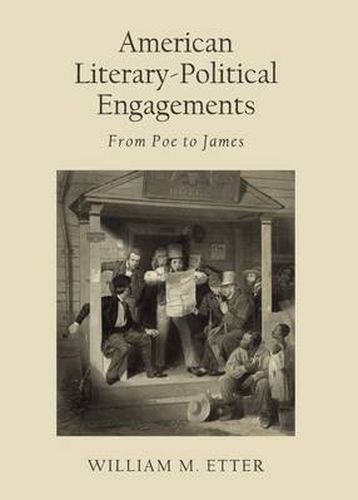Readings Newsletter
Become a Readings Member to make your shopping experience even easier.
Sign in or sign up for free!
You’re not far away from qualifying for FREE standard shipping within Australia
You’ve qualified for FREE standard shipping within Australia
The cart is loading…






American Literary-Political Engagements: From Poe to James examines how authors in the nineteenth-century United States often engaged the politics of their times through literature as they conceptualized political issues in literary terms. Concerns over Jacksonian democracy, social reform in a rapidly industrializing American economy, African-American familial cooperation in the post-Civil War era, changing conceptions of culpability with respect to the law, and marginalized individuals’ involvement in political agitation near the close of the century were made the central subjects of diverse literary works which, though not often characterized as overtly political, nevertheless made these political concerns a matter of and for literary art. Through examinations of Edgar Allan Poe’s comedic tales How to Write a Blackwood Article and A Predicament, Rebecca Harding Davis’ novel Margret Howth, Mattie J. Jackson’s postbellum slave narrative, William Dean Howells’ A Modern Instance, and Henry James’ The Princess Casamassima, this book considers how these texts enrich our understanding of nineteenth-century America’s conceptions of the possibilities and responsibilities of literature and of popular democracy, industrialization, African-American women, the law, political agitation, and disability.
$9.00 standard shipping within Australia
FREE standard shipping within Australia for orders over $100.00
Express & International shipping calculated at checkout
American Literary-Political Engagements: From Poe to James examines how authors in the nineteenth-century United States often engaged the politics of their times through literature as they conceptualized political issues in literary terms. Concerns over Jacksonian democracy, social reform in a rapidly industrializing American economy, African-American familial cooperation in the post-Civil War era, changing conceptions of culpability with respect to the law, and marginalized individuals’ involvement in political agitation near the close of the century were made the central subjects of diverse literary works which, though not often characterized as overtly political, nevertheless made these political concerns a matter of and for literary art. Through examinations of Edgar Allan Poe’s comedic tales How to Write a Blackwood Article and A Predicament, Rebecca Harding Davis’ novel Margret Howth, Mattie J. Jackson’s postbellum slave narrative, William Dean Howells’ A Modern Instance, and Henry James’ The Princess Casamassima, this book considers how these texts enrich our understanding of nineteenth-century America’s conceptions of the possibilities and responsibilities of literature and of popular democracy, industrialization, African-American women, the law, political agitation, and disability.